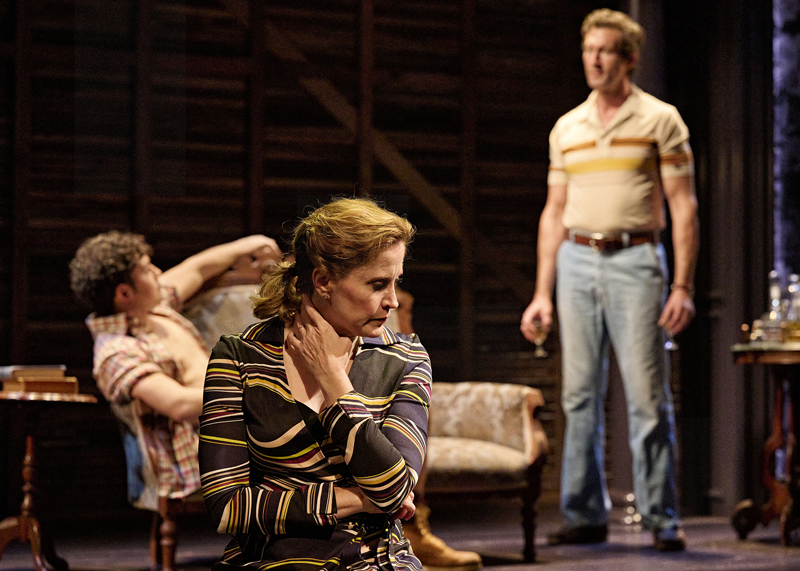“Fun Home” – TheaterWorks Hartford
Robert Schneider in Connecticut
24 October 2022
Skylar Lynn Matthews holds her arms out, banking left and right like a soaring bird—and she seems really to be flying. In a clear, strong voice she sings that she can see “all of Pennsylvania!” She holds nothing back, fully present on stage yet not at all self-conscious. She gives the performance of her life.

Christiane Noll (foreground).
Photo credit: Mike Marques.
Matthews just turned eleven. She’s one of those ingenious child actors who have yet to learn the theatrical flimflammery that adult actors enroll in conservatories to un-learn. There are three such wunderkind at TheaterWorks Hartford. They’re appearing in Fun Home, Jeanine Tesori and Lisa Kron’s Tony-winning 2013 musical based on the graphic novel memoir by Alison Bechdel. The adults in the cast are just as strong and thanks to the intimate space, we see and hear them very well.
Playing Young Alison, Matthews introduces us to a character that two other actresses will also represent: gangly Julia Nightingale plays Middle Alison, the same character in her freshman year at Oberlin; Sarah Beth Pfeifer plays Alison today, 43 years old and principal investigator of her own past, sometimes a narrator, sometimes a participant, often a silent witness.
The production takes Mathews’ freshness and throws it forward into a hazardous half-lifetime during which the character’s eagerness is gradually chipped away and replaced by a painful new perspective on family life.
Working on the same puzzle from the other end of the table, adult Alison looks backwards, sketching objects from her parents’ house to try and recapture the moment she first became aware of them. The main target of her exploration is her father, Bruce, who committed suicide when Alison was nineteen.
The clues to Bruce’s inner life are mostly architectural and decorative. In his first song he introduces young Alison to linen handkerchiefs — part of a hoard of objects discarded by a neighbour — and shows her the hallmark on a silver coffee pot. Later we see adult Alison, who’s become a cartoonist, drawing the same coffee pot as she tries to gain access to her father’s obsession with restoring and decorating old houses. What escapes her conscious understanding is still available to her pencil.

Sarah Beth Pfeifer and Aaron Lazar.
Photo credit: Mike Marques.
Bruce, it turns out, has created a flawless period décor for his family life as a false front for a second, still-more-passionate life as a gay man. As Bechdel puts it, “… he treated his furniture like children and his children like furniture.” While physically undemonstrative, he teaches his daughter the joys of literature, a prelude to her very bookish coming out at college. In one of the musicals most touching scenes, Middle Alison comes home and almost manages to have a conversation with her father about their shared sexual orientation (her mother had spilled the beans about Bruce’s double life over the phone). Tellingly, Nightingale passes the scene off to Pfeifer — the teenager becomes an adult when she’s taken into the confidence of other adults. The conversation doesn’t quite happen and Bruce steps in front of a truck a few months later.
The focus of three pairs of daughter-eyes, Aaron Lazar’s Bruce morphs from a self-assured high-school English teacher and part-time funeral director (the “fun” home of the title is, in fact, a funeral home) to a fugitive from family life of any kind. He takes refuge in fixing up a neglected old farmhouse, a ruin really, but he sings that “when the sunlight hits the parlour wall” he sees how fine a house it still could be.
Maybe because their heroine is a graphic novelist, Tesori and Kron’s songs have a straight-forward, “Let’s get this all down on paper” quality — furthered by Camilla Tassi’s projections of Bechdels’s original drawings — that eschews mystification and, to a lesser degree, mystery itself. Characters have secrets, but they invariably sing what’s on their mind, as when Christiane Noll, playing Alison’s long-suffering mother, recounts the “Days and Days” she’s had to put up with Bruce. On a lighter note, Nightingale’s Middle Alison discovers sex in college and announces she’s “Changing My Major” to Joan. As girlfriend Joan, a small but crucial part, Cameron Silliman is the sort of person you’d tell anything to three minutes after you meet her.
Certain doubts in Bechdel’s memoir (Was my father bisexual or gay? Was his death really a suicide?) are absent from Kron’s book and lyrics, fittingly so. Bechdel is a careful and conscientious writer — her memoir is replete with references to Homer, Joyce and Proust — but the task of the musical is to capture the quest of a careful and conscientious daughter.
Herin Kaputkin’s costumes manage to re-visit the 1970s without mocking them. Luke Cantarella’s set design makes use of TheaterWorks’ newly enlarged wing space to whisk heavy objects (a casket, a sideboard, a piano) on and off in an instant.
Jeff Cox directed six fine musicians whom we never see. Sadly, they remain invisible behind an upstage wall of unfinished lath.
Rob Ruggiero directed this very affecting production, lightly but deftly.









